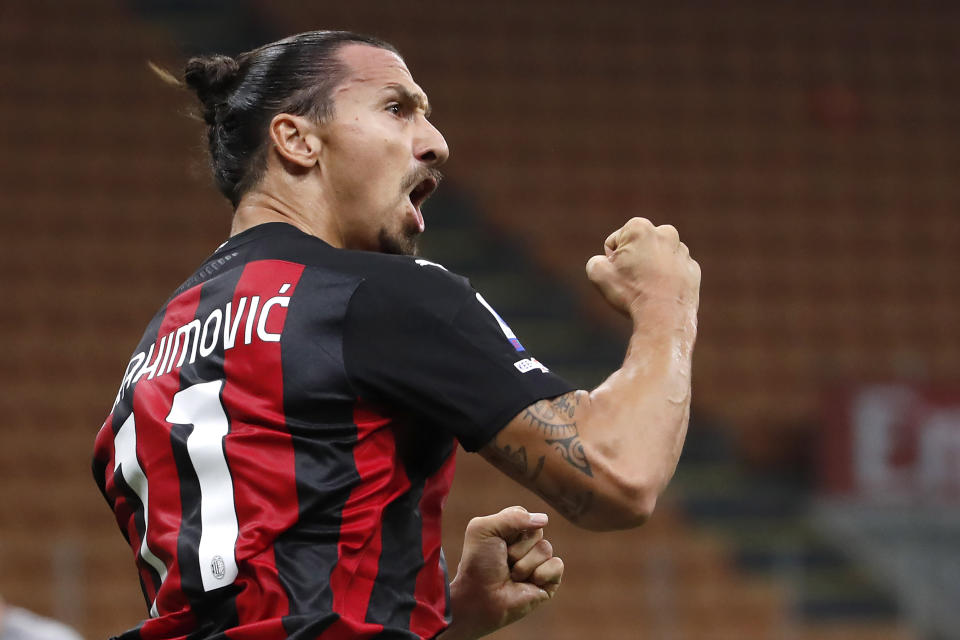Zlatan's ageless brilliance is indicative of a sports-wide trend: Prodigies don't seem to be breaking down anymore
There’s something Babe Ruthian about Zlatan Ibrahimovic. The sheer scale of his talent and his personality defy description. His size, towering over his peers. His unusual, ponytailed look. The outrageousness of his goals, the 20-yard bicycle kicks and the 40-yard half-volleys give them a where-were-you-when quality.
His gargantuan club career, which has featured 13 league titles and nearly 500 goals, would likely be remembered as one of the best of all time, had it not coincided with those of Lionel Messi and Cristiano Ronaldo, the greatest players ever. Zlatan’s outsized persona, carefully crafted from a cunning sense of humor and intelligence, is unmatched.
He is underappreciated. In spite of all those goals, all that silverware throughout his frequent travels from the world’s biggest clubs to the next, he has never placed in the top three for the Ballon d’Or prize for the world’s best player.
Yet at 39, almost a year after leaving Major League Soccer with 52 goals in 56 games for the LA Galaxy, Zlatan remains one of Europe’s most prolific forwards. Since returning to AC Milan in December, he has notched 16 goals and six assists in 22 games, including a Serie A-leading seven goals in just four games this season.
That makes Ibrahimovic remarkable in another way: as the frontrunner of a generation of apparently immortal footballers. Or players whose careers and effectiveness just won’t perish, at any rate.

Prodigy forwards used to trace a predictable career arc. They broke out as teenagers, dominated in their early 20s, begin to fall off in their mid-20s, and break down physically in their late 20s. All of those heavy minutes early on in their career eventually paid a toll. It was true for Michael Owen, a Liverpool and England star at 18 and a lumbering shadow of himself by 25. It happened to the Brazilian Ronaldo, who lit up Europe as a 21-year-old, lost two seasons to knee injuries two years later and was in unrecognizable decline before he was 30. Patrick Kluivert: same story, a Champions League-winning goal at 19, but washed up at 26.
Examples abound. Adriano. Nicolas Anelka. Even Wayne Rooney peaked in his early 20s, although he managed to stay healthy and productive.
That was how it worked, the price to pay for precociousness. They became stars early, lost a step early and retired early.
Ibrahimovic has defied that trend entirely, as have Messi and Cristiano Ronaldo. While they have all evolved — particularly Ronaldo, who went from a winger to an out-and-out striker in his late 20s — their efficiency this far into their careers is breathtaking.
Ibrahimovic scored 113 Ligue 1 goals for Paris Saint-Germain in just four seasons after he turned 30. The most productive season of his career, a 50-goal campaign in 2015-16, came when he turned 34.
Yet he was hardly a late bloomer. He had his first double-digit scoring season with Ajax when he was just 21. At 23, he was off to Juventus, continuing to win and score as he wound his way through Inter Milan, FC Barcelona, Milan, PSG and Manchester United, before arriving stateside.
Messi made 70 Barcelona first-team appearances as a teenager yet, at 33, remains the world’s most dominant player. With an astounding 935 competitive games in his legs for club and country, there isn’t a player in the world with his capability to change a game.
Ronaldo became a star at Sporting Lisbon as a 17-year-old and moved to Manchester United the next year. In his 18 seasons of senior team soccer, Ronaldo has never made fewer than 35 appearances. Last year, as a 35-year-old, he broke the Juventus record for goals in a single season. So far this year, he has more goals than appearances.
The longevity astounds.
Mostly because it flies in the face of conventional wisdom. Can all three of these generational talents defy the old notion that a player only had so many games in him? And that if you blew through them quickly, well, that was that?
It feels like a stretch for advances in sports science alone to explain the giant leap forward in the durability of athletes within the span of just a decade or so. But then it’s happening in other sports as well. At almost 36, LeBron James just smashed his way to a fourth NBA title. Roger Federer, Rafael Nadal and Novak Djokovic are 39, 34 and 33, respectively, many years past tennis players’ traditional expiration date, yet still winning. Serena Williams is also 39 and still playing well after having a baby and two pulmonary embolisms. Tom Brady is 43 and has quarterbacked the Tampa Bay Buccaneers to a 6-2 record, just one win short of their 2019 total without him.
And then there’s Zlatan, still irrepressibly and incorrigibly Zlatan. Looking for all the world like he has a few more good years in him yet. So long as he isn’t asked to explain it all.
Leander Schaerlaeckens is a Yahoo Sports soccer columnist and a sports communication lecturer at Marist College. Follow him on Twitter @LeanderAlphabet.
More from Yahoo Sports:



